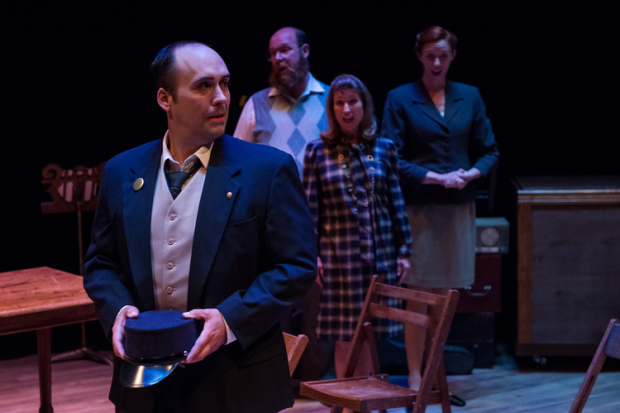A Man of No Importance

(© Earl Christie Photography)
A Man of No Importance, a 2003 musical by Lynn Ahrens, Stephen Flaherty, and Terrance McNally, chronicles the transformation of Alfie Byrne, who lives with his sister in 1960s Dublin. Bad Habits Productions, an off-off-Tremont Street company now entering its 10th year, has mounted a modest but ultimately engaging presentation of the show that brightens in the second act when the characters find the gumption to open themselves up to unimagined risks.
Alfie (Nicholas Magierowski-Howe) works as a ticket-taker on a trolley, where he breaks up the tedium by reading poetry aloud to his passengers and Robbie (Dan Prior), the driver of his car. At night, Alfie directs the St. Imelda Players, a community theater based at the local church hall. We know we are on the conservative turf of the faithful when the priest begins a rehearsal session of the play-within-a-play with a prayer.
Problem is, Alfie has chosen Oscar Wilde's Salome to stage for the group, and he casts a shy, young woman he meets on the bus, Adele (Dani Berkowitz), as Salome to perform the Dance of the Seven Veils. The disapproval of the church officials, plus Robbie's invitation for a night on the town, transforms Alfie's long-held patterns of behavior. He begins to realize that he must drop his buttoned up, protective covering and partake of the world as it exists, bigotry and all.
Alfie's personality is as uptight and well brushed as the vest and jacket of the uniform he wears every day, but he can hardly contain his repressed feelings, especially about his attraction to Robbie. Wilde's ghost (Kevin Fennessy in a top hat and cloak, trailing clouds of vapor) tries to goad him into tasting forbidden fruits. Director Daniel Morris has rearranged the space of the Wimberly Stage at the Calderwood Pavilion into an intimate theater, perfect for housing the unpretentious working-class people portrayed in the show.
Standouts among the ensemble include Mary O'Donnell as Lily Byrne, Alfie's sister, who has given up her hopes for a marriage to Mr. Carney to take care of her brother. Fennessy performs a mean soft-shoe number as an ensemble character filled with glee at the show until he turns coward over its content. Arthur Waldstein's Baldy O'Shea, the enthusiastic stage manager, sings a poignant song about marriage in memory of his deceased wife. But best of all is the robust, charismatic Prior as Robbie who neither judges Alfie nor abandons him when he needs a friend.
Despite their fine voices, Berkowitz and Magierowski-Howe are less effective in conveying the volatile natures of their characters through the dialogue other than through their songs. They tend to drop the volume of their two-person scenes and are inconsistent in their mastery of the dialect, making them difficult to understand.
Although the acting ensemble proves uneven in their acting abilities and handling of the dialect, their singing voices are burnished to an often thrilling crescendo of sound by the expertise of the music director, Meghan MacFadden, who also plays the keyboard and conducts a six-piece orchestra of musicians. Given the luster they bring to the proceedings, one might wish that the musicians had been credited in the program.
Morris, who also serves Bad Habits as producing artistic director, chose a challenging goal for his company with A Man of No Importance, given the subtlety of Alfie's unacknowledged desires. He lives in a culture where unspoken thoughts are no different than sins, not to be tolerated by the good folk he considers his friends. His triumph at the end is finding acceptance while learning to "love whom he loves," urged on by his imaginary friend, Oscar Wilde.











